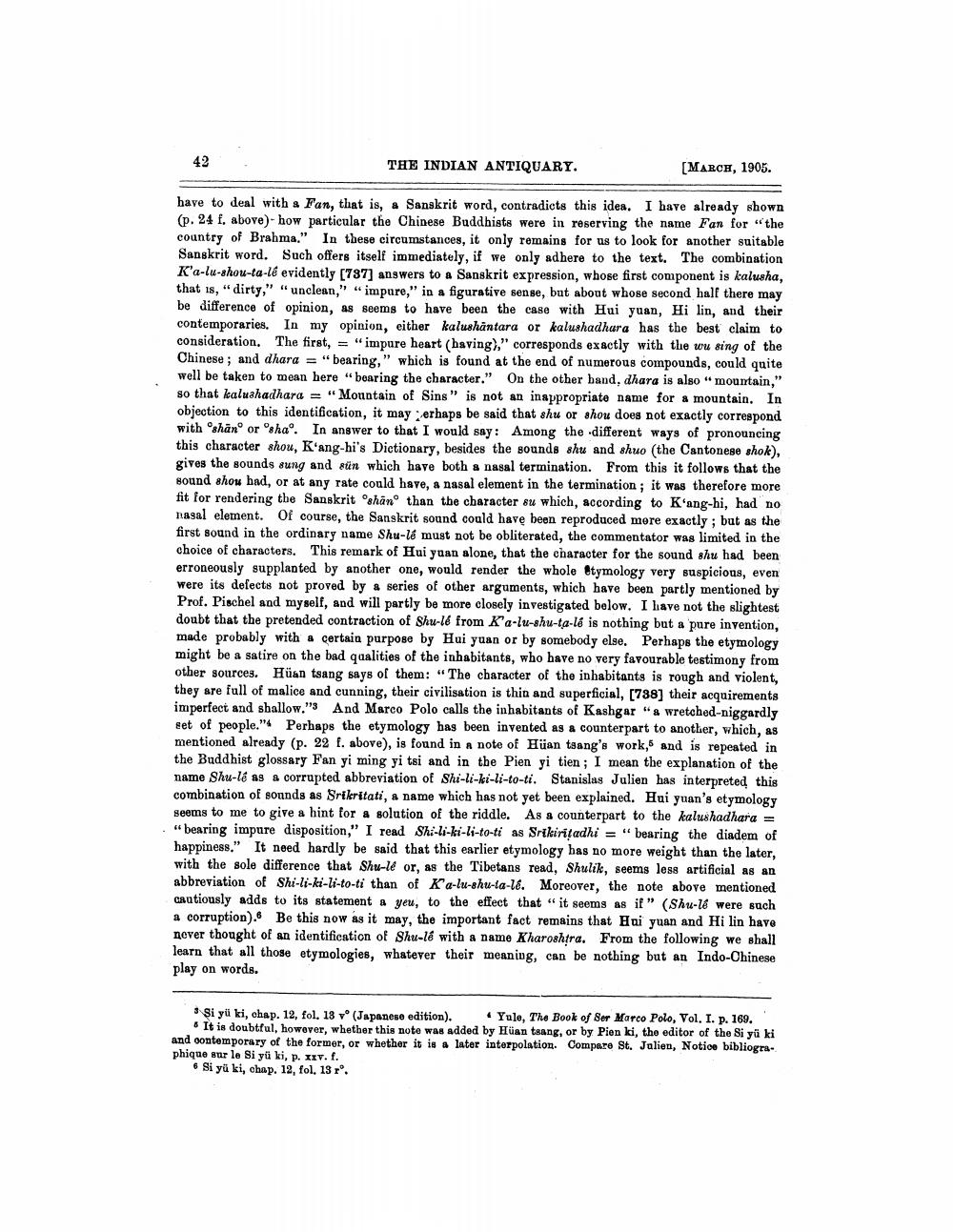________________
THE INDIAN ANTIQUARY.
=
have to deal with a Fan, that is, a Sanskrit word, contradicts this idea. I have already shown (p. 24 f. above)- how particular the Chinese Buddhists were in reserving the name Fan for "the country of Brahma." In these circumstances, it only remains for us to look for another suitable Sanskrit word. Such offers itself immediately, if we only adhere to the text. The combination K'a-lu-shou-ta-lé evidently [787] answers to a Sanskrit expression, whose first component is kalusha, that is, "dirty," "unclean," "impure," in a figurative sense, but about whose second half there may be difference of opinion, as seems to have been the case with Hui yuan, Hi lin, and their contemporaries. In my opinion, either kalushäntara or kalushadhara has the best claim to consideration. The first, "impure heart (having)," corresponds exactly with the wu sing of the Chinese; and dhara = "bearing," which is found at the end of numerous compounds, could quite well be taken to mean here "bearing the character." On the other hand, dhara is also "mountain," so that kalushadhara "Mountain of Sins" is not an inappropriate name for a mountain. In objection to this identification, it mayerhaps be said that shu or shou does not exactly correspond with 'shan" or "sha". In answer to that I would say: Among the different ways of pronouncing this character shou, K'ang-hi's Dictionary, besides the sounds shu and shuo (the Cantonese shok), gives the sounds sung and sun which have both a nasal termination. From this it follows that the sound shou had, or at any rate could have, a nasal element in the termination; it was therefore more fit for rendering the Sanskrit shän than the character su which, according to K'ang-hi, had no nasal element. Of course, the Sanskrit sound could have been reproduced more exactly; but as the first sound in the ordinary name Shu-lé must not be obliterated, the commentator was limited in the choice of characters. This remark of Hui yuan alone, that the character for the sound shu had been erroneously supplanted by another one, would render the whole etymology very suspicious, even were its defects not proved by a series of other arguments, which have been partly mentioned by Prof. Pischel and myself, and will partly be more closely investigated below. I have not the slightest doubt that the pretended contraction of Shu-lé from K'a-lu-shu-ta-lé is nothing but a pure invention, made probably with a certain purpose by Hui yuan or by somebody else. Perhaps the etymology might be a satire on the bad qualities of the inhabitants, who have no very favourable testimony from other sources. Hüan tsang says of them: "The character of the inhabitants is rough and violent, they are full of malice and cunning, their civilisation is thin and superficial, [788] their acquirements imperfect and shallow." And Marco Polo calls the inhabitants of Kashgar "a wretched-niggardly set of people." Perhaps the etymology has been invented as a counterpart to another, which, as mentioned already (p. 22 f. above), is found in a note of Hüan tsang's work, and is repeated in the Buddhist glossary Fan yi ming yi tsi and in the Pien yi tien; I mean the explanation of the name Shu-le as a corrupted abbreviation of Shi-li-ki-li-to-ti. Stanislas Julien has interpreted this combination of sounds as Srikritati, a name which has not yet been explained. Hui yuan's etymology seems to me to give a hint for a solution of the riddle. As a counterpart to the kalushadhara = "bearing impure disposition," I read Shi-li-ki-li-to-ti as Srikiritadhi = "bearing the diadem of happiness." It need hardly be said that this earlier etymology has no more weight than the later, with the sole difference that Shu-lé or, as the Tibetans read, Shulik, seems less artificial as an abbreviation of Shi-li-ki-li-to-ti than of Ka-lu-shu-ta-lé. Moreover, the note above mentioned cautiously adds to its statement a yeu, to the effect that "it seems as if" (Shu-le were such a corruption). Be this now as it may, the important fact remains that Hui yuan and Hi lin have never thought of an identification of Shu-lé with a name Kharoshtra. From the following we shall learn that all those etymologies, whatever their meaning, can be nothing but an Indo-Chinese play on words.
42
[MARCH, 1905.
3 Si yü ki, chap. 12, fol. 13 v° (Japanese edition).
Yule, The Book of Ser Marco Polo, Vol. I. p. 169.
It is doubtful, however, whether this note was added by Hüan tsang, or by Pien ki, the editor of the Si yü ki and contemporary of the former, or whether it is a later interpolation. Compare St. Julien, Notice bibliographique sur le Si yü ki, p. xxv. f.
6 Si yü ki, chap. 12, fol. 13 r.




